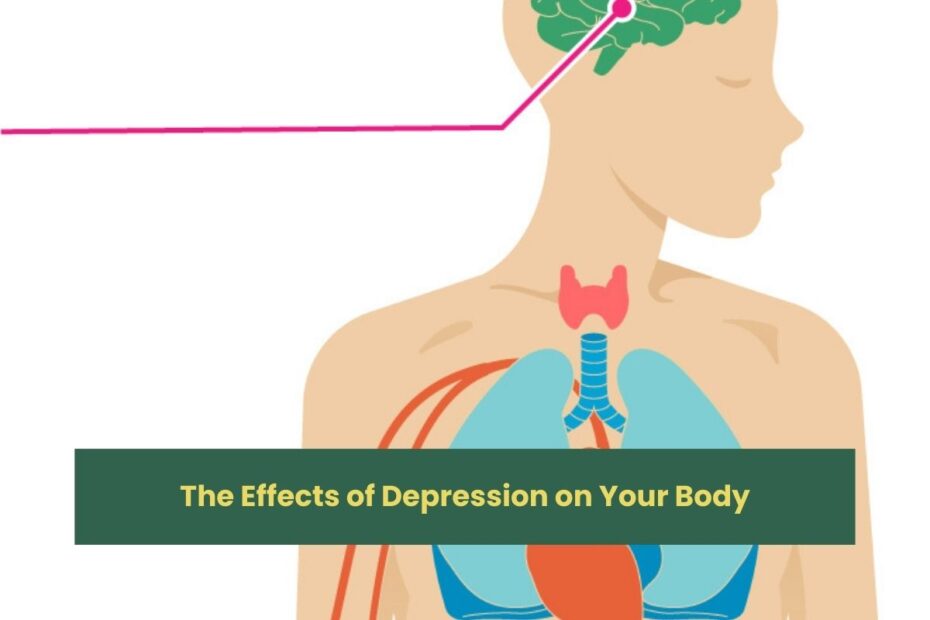People usually think of depression as a mental health problem, but it has effects on the whole body that affect health and well-being in general. This illness is complicated and affects not only mood and brain function but also very important body functions. Knowing about these effects can help people with depression and their doctors better deal with the complex nature of the illness and its treatment.
The Effects of Depression on Your Body
1. Neurological Impact
Depression has big effects on how the brain works. Changes in brain chemistry, especially with neurotransmitters like serotonin, norepinephrine, and dopamine, are linked to the disease. These hormones are very important for controlling our thoughts, feelings, and moods. When these neurotransmitters are out of balance or disrupted, it can cause signs like depression, anxiety, and trouble focusing.
People who are depressed have also been seen to have changes in the structure of their brains. Brain imaging studies have shown that the hippocampus, a part of the brain that controls memory and emotions, is getting smaller. The prefrontal cortex, a part of the brain that controls decision-making and impulse control, is also changing. These changes can make the problems that come with sadness worse, like not being able to think clearly and being emotionally unstable.
2. Cardiovascular Health
Heart problems are more likely to happen if you are depressed. High amounts of cortisol and other stress hormones can be caused by long-term stress and the body’s stress response system being activated over and over again. This is bad for heart health. This lack of hormones can make blood pressure, heart rate, and inflammation in the arteries worse.
People who are depressed may also be more likely to do unhealthy things like smoking, drinking too much booze, and making bad food choices, all of which raise the risk of heart disease. These things can make it more likely that you will get heart disease, high blood pressure, and other conditions that are linked.
3. Immune System Function
The immune system can get weaker when someone is depressed, which makes the body more likely to get sick or get diseases. High amounts of inflammatory markers like C-reactive protein (CRP) and cytokines show that people who are depressed for a long time have more inflammation in their bodies. This inflammation can weaken the immune system, making it harder for the body to fight off germs and raising the risk of getting long-term illnesses.
Also, the stress that comes with sadness can change the way the immune system works by changing the balance of immune cells and the production of antibodies. This imbalance can make you more likely to get sick and take longer to heal from infections.
4. Digestive Health
Having sadness can have a big effect on your digestive health. The gut-brain axis is a complicated network of nerves that connects the gut to the brain. It is a key part of this relationship. This axis can get messed up by depression, which can cause stomach problems like sickness, diarrhea, constipation, and irritable bowel syndrome (IBS).
Depression can also change the way people eat, either making them overeat or lose their desire. This can lead to not getting enough nutrients and changing weight, which makes gut health even more difficult. For some people, these changes can end up creating a vicious loop in which stomach pain makes depressive symptoms worse and so on.
5. Musculoskeletal System
Muscle and joint pain can be made worse by long-term sadness. Muscle pain and stiffness can be caused by long-term stress and tightness, especially in the neck, shoulders, and back. This pain in the body can make you feel even more tired and lower your quality of life.
In addition, people who are depressed may notice changes in how much they exercise. Less physical exercise can make you lose muscle tone and cause problems with your bones and muscles, like making your joints less flexible. This can make you feel even more tired and uncomfortable, which can keep you from doing anything and make your depressed symptoms worse.
6. Sleep Patterns
Depression can make it hard to sleep, which can lead to either sleeplessness or hypersomnia (too much sleep). People with insomnia may have trouble going asleep, wake up a lot during the night, or wake up too early. Hypersomnia, on the other hand, can cause people to sleep for longer periods of time and feel sleepy during the day. Both of these problems can have a big effect on your physical health, making you tired, lowering your brain power, and generally making you feel worse.
Not getting enough good sleep also makes it harder for the body to control hormones, deal with stress, and keep the immune system healthy. This makes the physical effects of depression even worse, causing a cycle where lack of sleep makes depressive symptoms worse and vice versa.
7. Sexual Health
Being depressed can affect your physical health and ability. People may have a lower libido, trouble getting aroused, or issues with their sexual function. Hormonal imbalances, psychological factors, and the general lack of interest or energy that comes with sadness can all cause these changes.
Sexual health problems can have an effect on relationships and self-esteem, which can add to stress and mental strain. To solve these problems, people usually need to take a multifaceted approach that includes mental health treatment and open discussion with their partners and healthcare providers.

Well, if depression leads to loss of memory and cognitive function or the reverse is true, is to be discussed. If an individual has lower mental abilities he will not be able to work to his expected lever or rise to his level of expectations. This inturn can lead to depression. Well the same person has been found to be v much interested in sex. So without proper discussion, generalisations can be misleading.